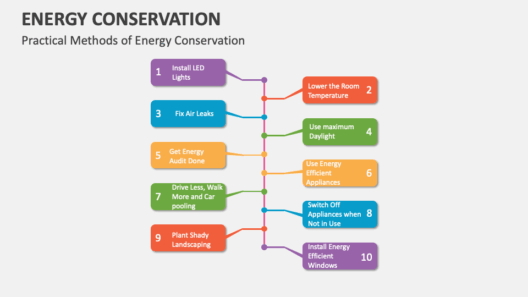In a world increasingly susceptible to fatigue, both mental and physical, the concept of energy conservation transcends mere sustainability; it beckons us to reevaluate our lifestyle choices and the very architecture of our daily routines. As individuals, we often neglect the finite nature of our energy reserves. The pressures of modern life can leave us drained, unproductive, and in a state where our potential remains unfulfilled. This exploration into the conservation of body and mental energy aims to offer not merely strategies but a paradigm shift, urging a considerate examination of how we harness and allocate our energy in pursuit of a more vibrant existence.
Firstly, it is crucial to delineate what we mean by body and mental energy. Body energy, articulated through physical prowess, is derived from the sustenance we consume and the activities we engage in. Conversely, mental energy, often overshadowed by its physical counterpart, manifests in our cognitive capabilities—our ability to focus, make decisions, and navigate emotional landscapes. When we discuss conservation, we are tackling a dual-faceted issue that interlocks the physiological and psychological components of our beings.
Consider the notion of energy as a currency. Just as financial acumen equips individuals to spend wisely, so too must we be astute in our energy expenditures. In the quest for heightened productivity, it is common to overspend our energy on tasks, which precipitates a correspondingly steep decline in overall performance. Herein lies the crux of energy conservation. By employing strategies that facilitate restoration rather than depletion, we can enhance our lives vastly.
One powerful approach in this pursuit is the implementation of structured breaks. Research has consistently unveiled that brief interludes can significantly bolster focus and stamina. Techniques, such as the Pomodoro Technique—where individuals work intensively for 25 minutes followed by a five-minute respite—serve to rejuvenate the brain. These well-timed pauses can avert the pernicious effects of fatigue and promote sustained engagement. Harnessing the rejuvenating power of nature during these breaks could amplify the benefits. A simple stroll amidst greenery serves to invigorate the mind and replenish depleting energy stores.
Moreover, sleep, often overlooked in discussions about productivity, is the bedrock of energy conservation. The restorative value of sleep is monumental, impacting physical well-being and cognitive prowess. Quality sleep plays a critical role in emotional regulation, decision-making, and problem-solving abilities. A consistent sleep schedule aids in paving the way for a refreshed mind, allowing individuals to meet daily challenges with vigor and clarity. Thus, prioritizing restorative sleep is an underrated yet essential mechanism in the conservation of our energy.
Nutrition forms another cornerstone in the realm of energy conservation. The nutritional choices an individual makes can either bolster or drain energy levels. A diet rich in complex carbohydrates, lean proteins, and an array of vitamins and minerals fosters sustained energy levels, while processed foods laden with sugars can incite energy spikes followed by crashes. Recognizing the long-term implications of our dietary selections cultivates an awareness that profound effects can stem from relatively simple adjustments. Integrating whole foods and maintaining hydration can curtail the fleeting energy fluctuations that so many experience daily.
Further compounding the conversation around energy is the mental chatter that pervades our consciousness. The incessant stream of thoughts can become a drain on mental energy, often hindering one’s capacity to engage fully. Mindfulness techniques, including meditation and deep-breathing exercises, have been substantiated as efficacious methods to quiet the mind. By creating space within the mental noise, individuals can conserve cognitive energy, thereby allowing for greater focus and creativity. These practices do more than merely alleviate stress; they foster a habitual dexterity in managing one’s emotional and cognitive resources.
Social interactions, too, significantly impact both body and mental energy. Engaging with others can uplift the spirit, yet contentious relationships may deplete energy reserves. Consequently, it’s vital to curate one’s social circle, prioritizing connections that foster positivity and support personal growth. Finding your tribe can rejuvenate energy levels, providing a source of renewal and motivation, which in itself serves as a powerful form of energy conservation.
Beyond these individualized strategies lies the organizational aspect of energy management. In workplaces, the structuring of tasks and meetings can have wide-reaching implications for collective energy conservation. Creating environments that prioritize focus, collaboration, and inclusivity can prevent energy depletion that often comes from inefficient practices. Flexible work arrangements, for instance, can invigorate employees, allowing them to perform at their best and conserve their mental faculties effectively.
Lastly, the societal embrace of energy conservation cannot be overlooked. Communities that foster robust public transport systems and encourage active lifestyles—walking, cycling, or engaging in sports—promote a culture of energy awareness. The ripple effects of community engagement in conservation set a standard that reverberates through generations. When society prioritizes the well-being and energy conservation of its members, it catalyzes a broader movement towards sustainable practices and holistic health.
As we navigate the complexities of modern existence, the synergy of body and mental energy conservation emerges as a vital component of a fulfilling life. It beckons us to rethink our engagement with the world, urging a balance between activity and restoration. Each small adjustment in our daily lives, whether through structured breaks or dietary choices, holds the potential to conserve our energy in meaningful ways. By considering energy not merely as a resource to be expended, but as a treasure to be nurtured, we embark on a transformative journey towards a more energized existence.






